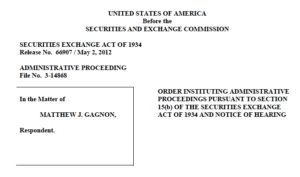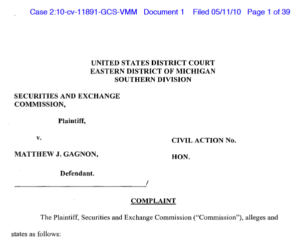Types of SEC Cases: HYIP (High Yield Investment Program) Fraud
SEC Wins Over $4.2 Million Judgment Against Perpetrator of HYIP Fraud / Ponzi Scheme
The SEC filed a complaint in federal court against Matthew J. Gagnon (“Gagnon”). That court Complaint alleged that Gagnon used his company Mazu Publishing Company (“Mazu”) to make false and misleading statements and material omissions, sell unregistered securities, facilitate a HYIP (high yield investment program) fraud, and perpetrate a Ponzi scheme fraud. The court granted summary judgment in the SEC’s favor and against Gagnon. Thereafter, the SEC also brought a separate administrative proceeding against Gagnon. The SEC’s Order Instituting that Administrative Proceeding (the “Admin Order”) explained that the Court had ordered Gagnon to pay over $4.2 million in disgorgement, prejudgment interest, and civil penalties to the SEC due to Gagnon’s role in the HYIP fraud, Ponzi scheme, and other frauds and violations.
The SEC’s Administrative Order
Background Of The Legisi HYIP / Ponzi Scheme
Gagnon was the sole shareholder, officer, and director of Mazu. (Admin Order p. 2.) According to the SEC’s court Complaint, Mazu was a website that Gagnon promoted as “the world’s first and largest opportunity website”. Gagnon held himself out as an “Internet business opportunity expert.” On the Mazu website, Gagnon reviewed various investment opportunities, and brazenly provided detailed warnings for his readers about HYIP frauds and Ponzi schemes. (Court Complaint, pp. 1-2, 18; Admin Order p. 2.) Gregory N. McKnight operated a pooled investment program called either Legisi.com or just Legisi (the “Legisi Program”). Among other things, the SEC claimed that the Legisi Program was both a high yield investment program fraud and a “massive” Ponzi scheme. (Court Complaint, pp. 6, 19.) Gagnon apparently agreed to promote the Legisi Program to his readers on his Mazu website. (Court Complaint, p. 7.) The investment contracts that were sold for the Legisi Program were unregistered stock offerings, because there was no valid registration statement filed or in effect with the SEC covering them. (Court Complaint, p. 9.) Gagnon allegedly made false and misleading statements, and material omissions, about the Legisi Program on the Mazu website and in other communications with potential investors. (Court Complaint, pp. 11-19.)Gagnon Promotes The Legisi HYIP And Ponzi Scheme To Mazu Readers
Gagnon sent some potential investors “Mazu Business Packs”. In one of those Packs, Gagnon apparently identified the Legisi Program as an HYIP, calling it “‘the only genuine high yield passive income program that we at Mazu have ever found.’” (Court Complaint, p. 13.) Gagnon similarly touted the Legisi HYIP in another Mazu Business Pack: “‘IN ALL OUR EXPERIENCE IF (sic) HIGH YIELD PROGRAMS THIS IS THE ONLY GENUINE PROGRAM THAT WE HAVE EVER FOUND!’” (Court Complaint, p. 13) (emphasis in original.) On the Mazu website, Gagnon told readers about the Legisi HYIP:When a Mazu Partner came to us and wanted to put together a program that offered high level returns with low risk … we knew he had a winner…. It’s not a trick, it’s not a scam … It’s a simple loan program where you get to determine the terms in which you’re paid back.
Want 8.5% interest paid to your account monthly? Great! Want 10 or even 12% (now 15%!)? No problem….
* * * * * * *
Think of it….Mazu’s credibility, high yield returns in the form of “repayments” to you, and you don’t have to do anything to do very well. Well, nothing other than fund an account….
(Court Complaint, p. 13.) According to the SEC, these statements were false and misleading. During the relevant time period, McKnight and the Legisi Program had net realized and unrealized losses of approximately $3,771,723. (Court Complaint, p. 16.)
The SEC’s court Complaint
Gagnon Allegedly Perpetrated Two Other Fraudulent Schemes
The court Complaint and the Administrative Order contain a lot more facts and details about the Legisi HYIP fraud and Ponzi scheme, the illegal sale of unregistered securities, and Gagnon’s public statement fraud and material omissions. Those documents also contain details about other frauds that the SEC charged Gagnon with, such as an allegedly fraudulent Real Estate Program, and an allegedly fraudulent Managed Forex Trading Offering. Among other things, these additional fraud schemes also supposedly involved false statements, material omissions, and sales of unregistered securities. The additional details about the Legisi HYIP fraud and Ponzi scheme, and the two additional schemes, are too lengthy and numerous to summarize here. But if you are interested, you can read about them in the court Complaint and in the Administrative Order. For your convenience, external links to those documents are provided at the bottom of this page.Whistleblowers Can Report HYIP Frauds, Ponzi Schemes, False And Misleading Statements, Material Omissions, And Sales Of Unregistered Securities, To The SEC
This case illustrates some types of misconduct that could give rise to SEC whistleblower cases if reported to the Commission through the SEC whistleblower program. However, the SEC has not made any public statement as to whether this case was itself an actual SEC whistleblower case. The SEC Office of the Whistleblower posts Notices of Covered Action (“NoCA”) for Commission actions where a final judgment or order results in monetary sanctions exceeding $1 million. The NoCA list does not disclose if a particular Enforcement action was brought as the result of an SEC whistleblower case, tip, complaint, or referral being filed with the Commission.Additional Information
For more information about HYIP frauds, Ponzi schemes, and the other frauds and violations that the SEC charged Gagnon with, click on the links below:- The SEC’s Administrative Order in the Gagnon case. (External link to the SEC’s website.)
- The SEC’s Court Complaint in SEC v. Gagnon. (External link to the SEC’s website.)







